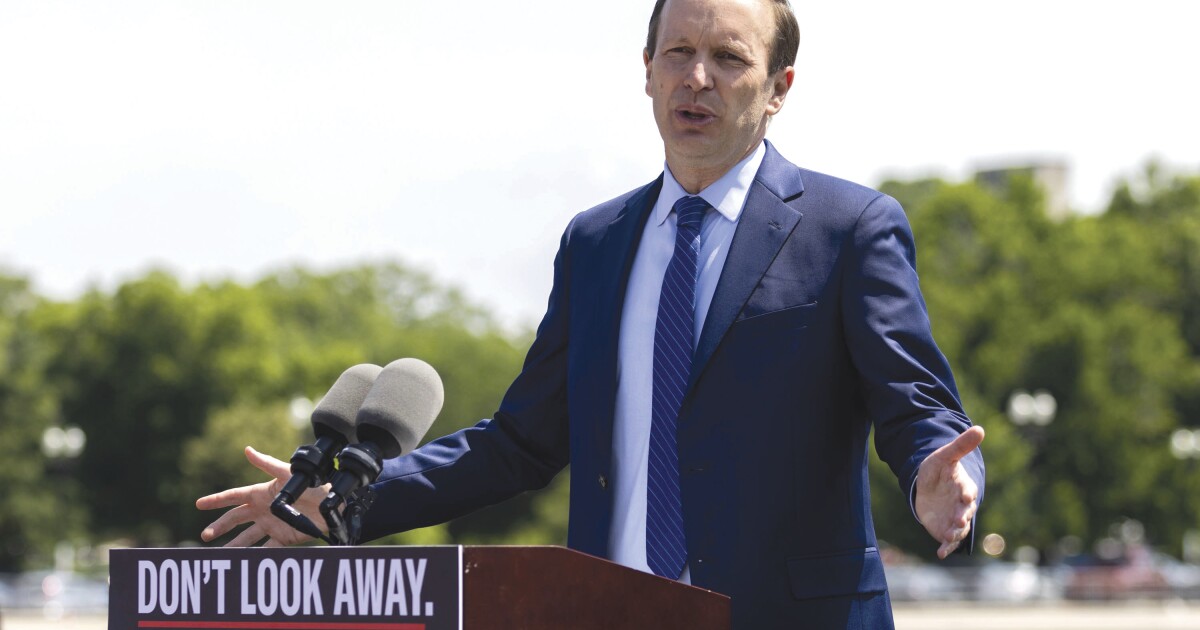

Senate lawmakers are still untangling snags in the structure of their highly anticipated gun reform deal, even as its proponents push to turn their agreement into law by the time Congress leaves for its July 4 recess.
Lawmakers still have significant work to do before the agreement can become law.
And members of Congress from both the Right and the Left found reasons to object to the proposals before they became part of a legislative text.
“Will this bill do everything we need to end our nation’s gun violence epidemic? No,” said Sen. Chris Murphy (D-CT) as he unveiled the framework last week. Murphy was one of the deal’s top negotiators.
Just days after the announcement of a deal, its negotiators had the backing of Senate leadership on both sides — a promising sign for its likelihood of passing.
However, unanswered questions remain about whether the deal will become law despite the formidable number of senators who signed on to the agreement in principle.
WHAT WOULD IT DO?
The reforms would address a number of fronts in the fight over what drives mass shootings that Democrats and Republicans have characterized as problematic — although, in some cases, not as directly as the Left had wanted.
The bill would fund grants meant to encourage states to pass red flag laws that enable a court to determine whether a gun owner is dangerous enough to require authorities to take his or her guns.
Red flag laws typically work by enabling friends and family to petition a court to issue crisis intervention orders, allowing law enforcement to confiscate guns from that person’s home.
Republicans have vociferously opposed red flag laws in the past because they argue that such measures deny a person due process by allowing for the removal of guns absent the commission of a crime.
The deal, as announced, would also close what’s known as the “boyfriend loophole.”
While federal law prohibits anyone convicted of abusing a spouse, live-in partner, or co-parent from buying a firearm, it does not stop an abusive dating partner from obtaining a gun, according to Everytown for Gun Safety, a gun control group.
Lawmakers agreed to set aside billions of dollars for expanded mental health and school safety programs. Those include investments in expanding telehealth access for young people in need of mental healthcare and investments in violence prevention efforts at school.
To regulate what kinds of gun purchases require federal background checks further, the deal would also clarify the definition of what constitutes a commercial firearm dealer, whose transactions are subject to more stringent background check requirements than private sellers.
Addressing a particularly contentious sticking point, given that the shooting suspects in Uvalde and Buffalo were both 18 years old, the deal would implement new background check requirements on prospective gun owners under the age of 21. Those younger than 21 looking to buy certain rifles would have to wait until an enhanced background check is completed before they could pick up their guns. Handgun sales are already illegal under the age of 21.
The bill would also crack down more aggressively on straw purchasing, which is when a person eligible to purchase a firearm does so on behalf of someone else.
WHAT GOT LEFT OUT?
Democrats had been hopeful that they could secure backing for a law that would raise the minimum age for the purchase of certain kinds of rifles from 18 to 21. The compromise enhanced background checks for younger buyers but did not touch the age limits.
Some discussions about pursuing a federal red flag law did not produce one in the deal. The grant program would encourage red flag laws on the state level but not nationally.
Previous rounds of gun talks had toyed with the prospect of expanding background checks to types of gun sales that don’t require them, such as private sales between friends or family members. Background checks were not expanded in the Senate deal, except in the case of young rifle buyers.
And the so-called Charleston loophole, named for the provision of law that allowed the shooter in a 2015 massacre in a Charleston church to obtain his firearm before his background check was completed, which could have shown him ineligible for gun ownership, would remain open under the deal.
WHO SUPPORTS IT?
Ten Republican senators agreed to the general principles of the framework announced earlier this month — a crucial number, given that their support, in theory, paved the way for the bill to advance past the filibuster.
Sens. John Cornyn (R-TX), Thom Tillis (R-NC), Roy Blunt (R-MO), Richard Burr (R-NC), Bill Cassidy (R-LA), Susan Collins (R-ME), Lindsey Graham (R-SC), Rob Portman (R-OH), Mitt Romney (R-UT), and Pat Toomey (R-PA) all signed a statement supporting the initial framework of the deal.
Notably, six of those Republicans won’t appear on the ballot in November — giving them cover to support a deal that conservatives have already panned.
For example, Rep. Bob Good (R-VA) labeled the 10 Republican senators the “Surrender Caucus” and accused them of conspiring with “gun-grabbing Democrats” to strip the people of gun rights.
WHAT COULD STOP IT?
Perils remained for the deal even as the draft process got underway despite the promising amount of support its framework received in the hours after its announcement.
Snags could appear as congressional aides scramble to turn the broad framework into legislative text, which could require a level of objectionable detail that the handshake deal has so far omitted.
Among those that have already arisen: how to structure the grant program for red flag laws.
Just days after unveiling the framework, lawmakers were sparring over whether the program should be structured to offer states additional funding to incentivize the passage of red flag laws — or to withhold funding from states that decline to do so.
Republicans wanted to continue offering money for mental health and other programs even if states decide not to pass red flag laws. Democrats reportedly expressed concerns that if the grants were used as carrots rather than sticks, the incentive value of the funding would be diminished.
The price tag could also emerge as an insurmountable hurdle, with conservatives already wary of how much spending the Biden administration has secured amid the specter of inflation.
The so-called boyfriend loophole was already causing problems days after 10 Republican senators signed on to the framework.
Democrats reportedly wanted the definition of a dating partner broadly defined, covering a range of types of relationships and misdemeanor abuse-related charges that could subject a person to losing gun access.
Republicans, meanwhile, were reportedly pushing to craft a more narrow definition to avoid wrongly denying a person innocent of domestic abuse the ability to purchase a firearm.
The deal could also face challenges from the Left, which has already suggested the bill is insufficiently tough on guns.
Shortly after the announcement of the deal, Rep. Alexandria Ocasio-Cortez (D-NY) said that while she remained open to the possibility of supporting the agreement, she was “disappointed” that, in her view, it increased “juvenile criminalization.”
“We have to look at the text,” she said of what would have to happen before she could pledge support.
WHAT HAPPENS NEXT?
Senate lawmakers said the staff got to work drafting legislative text last week, meaning the deal is moving forward quickly.
Given the many components of the agreement, however, it could be a lengthy process that stretches beyond when supporters have said they want to see the deal advance.
Lawmakers had run into problems within a few days of announcing the framework, although all sides maintained optimism that the deal would proceed on the prescribed timeline.
Members of Congress initially aimed to pass the bill by June 24, when they head home for the July 4 recess, but all involved have acknowledged the ambitious nature of that goal.




